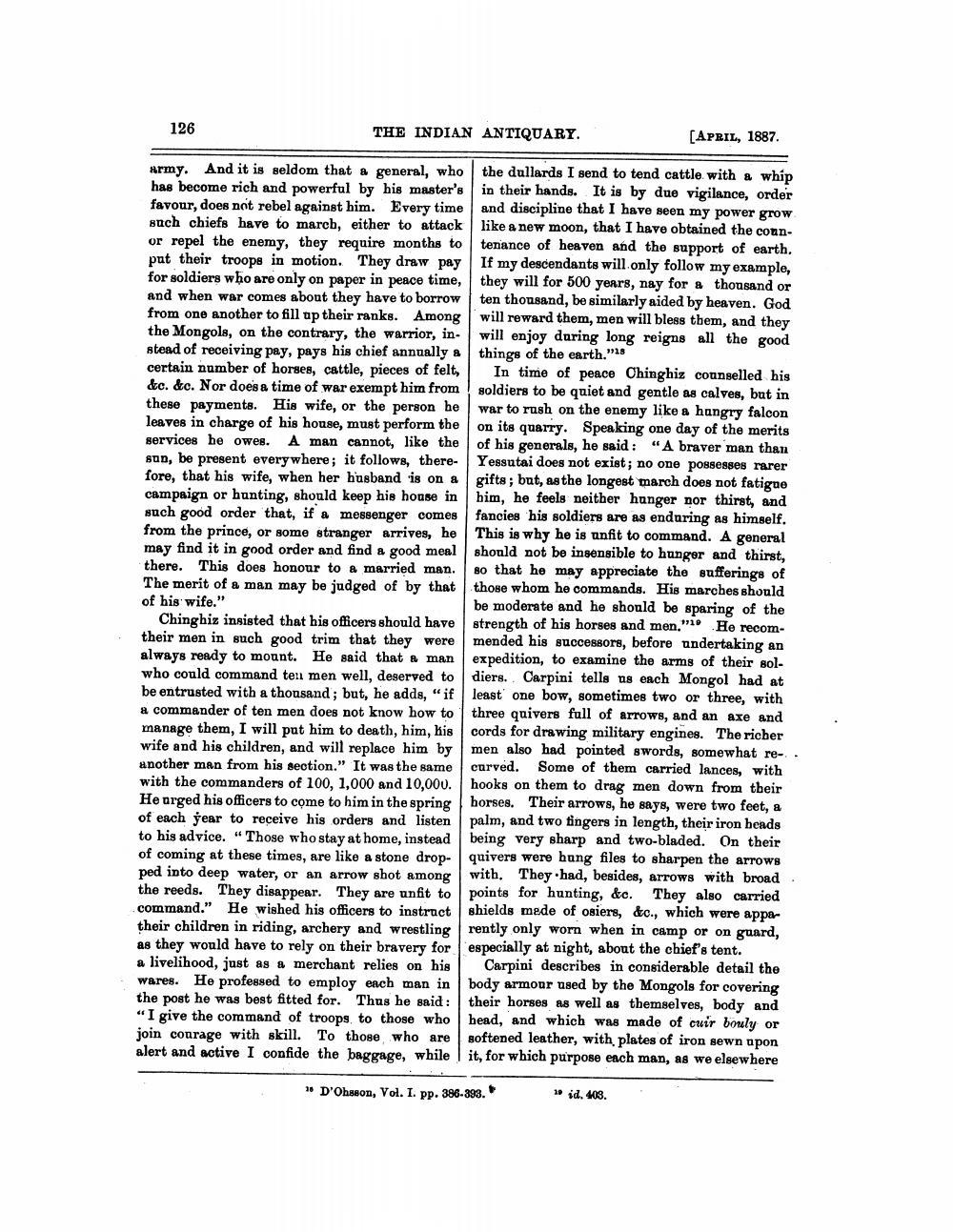________________
126
THE INDIAN ANTIQUARY.
army. And it is seldom that a general, who has become rich and powerful by his master's favour, does not rebel against him. Every time such chiefs have to march, either to attack or repel the enemy, they require months to put their troops in motion. They draw pay for soldiers who are only on paper in peace time, and when war comes about they have to borrow from one another to fill up their ranks. Among the Mongols, on the contrary, the warrior, instead of receiving pay, pays his chief annually a certain number of horses, cattle, pieces of felt, &c. &c. Nor does a time of war exempt him from these payments. His wife, or the person he leaves in charge of his house, must perform the services he owes. A man cannot, like the sun, be present everywhere; it follows, therefore, that his wife, when her husband is on a campaign or hunting, should keep his house in such good order that, if a messenger comes from the prince, or some stranger arrives, he may find it in good order and find a good meal there. This does honour to a married man. The merit of a man may be judged of by that of his wife."
Chinghiz insisted that his officers should have their men in such good trim that they were always ready to mount. He said that a man who could command ten men well, deserved to be entrusted with a thousand; but, he adds, "if a commander of ten men does not know how to manage them, I will put him to death, him, his wife and his children, and will replace him by another man from his section." It was the same with the commanders of 100, 1,000 and 10,000. He urged his officers to come to him in the spring of each year to receive his orders and listen to his advice. "Those who stay at home, instead of coming at these times, are like a stone dropped into deep water, or an arrow shot among the reeds. They disappear. They are unfit to command." He wished his officers to instruct their children in riding, archery and wrestling as they would have to rely on their bravery for a livelihood, just as a merchant relies on his wares. He professed to employ each man in the post he was best fitted for. Thus he said: "I give the command of troops to those who join courage with skill. To those who are alert and active I confide the baggage, while
[APRIL, 1887.
the dullards I send to tend cattle with a whip in their hands. It is by due vigilance, order and discipline that I have seen my power grow. like a new moon, that I have obtained the countenance of heaven and the support of earth. If my descendants will only follow my example, they will for 500 years, nay for a thousand or ten thousand, be similarly aided by heaven. God will reward them, men will bless them, and they will enjoy during long reigns all the good things of the earth."18
In time of peace Chinghiz counselled his soldiers to be quiet and gentle as calves, but in war to rush on the enemy like a hungry falcon on its quarry. Speaking one day of the merits of his generals, he said: "A braver man than Yessutai does not exist; no one possesses rarer gifts; but, as the longest march does not fatigue him, he feels neither hunger nor thirst, and fancies his soldiers are as enduring as himself. This is why he is unfit to command. A general should not be insensible to hunger and thirst, so that he may appreciate the sufferings of those whom he commands. His marches should be moderate and he should be sparing of the strength of his horses and men." "He recommended his successors, before undertaking an expedition, to examine the arms of their soldiers. Carpini tells us each Mongol had at least one bow, sometimes two or three, with three quivers full of arrows, and an axe and cords for drawing military engines. The richer men also had pointed swords, somewhat re-.. curved. Some of them carried lances, with hooks on them to drag men down from their horses. Their arrows, he says, were two feet, a palm, and two fingers in length, their iron heads being very sharp and two-bladed. On their quivers were hung files to sharpen the arrows with. They had, besides, arrows with broad points for hunting, &c. They also carried shields made of osiers, &c., which were apparently only worn when in camp or on guard, especially at night, about the chief's tent.
Carpini describes in considerable detail the body armour used by the Mongols for covering their horses as well as themselves, body and head, and which was made of cuir bouly or softened leather, with plates of iron sewn upon it, for which purpose each man, as we elsewhere
18 D'Ohsson, Vol. I. pp. 386-393.
19 id. 403.




